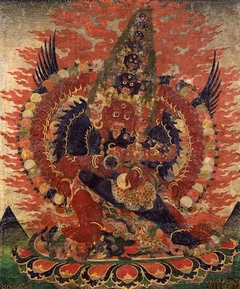Chokling Kagyé Lineage Prayer
༄༅། །དམ་ཆོས་རྫོགས་པ་ཆེན་པོ་སྡེ་གསུམ་ལས། གསང་སྐོར་བཀའ་བརྒྱད་རྫོང་འཕྲང་གི་བརྒྱུད་པའི་གསོལ་འདེབས་སྣང་བ་རང་གྲོལ་བཞུགས་སོ། །
The Natural Liberation of Perception
A Lineage Prayer for the Secret Fortress and Ravine Cycle of the Eight Great Maṇḍalas,1 from the Sacred Dharma of The Three Classes of the Great Perfection2
by Jamgön Kongtrul Lodrö Thayé
གདོད་མའི་མགོན་པོ་ཆོས་སྐུ་ཀུན་ཏུ་བཟང་། །
dömé gönpo chöku kuntuzang
Dharmakāya Samantabhadra, primordial protector,
དཀྱིལ་འཁོར་ཀུན་བདག་ལོངས་སྐུ་རྡོ་རྗེ་སེམས། །
kyilkhor kün dak longku dorjé sem
Saṃbhogakāya Vajrasattva, lord of all maṇḍalas,
སྤྲུལ་པའི་སྐུར་སྣང་རང་བྱུང་ཧེ་བཛྲ། །
trulpé kur nang rangjung benza hé
Nirmāṇakāya Hevajra, naturally arisen,
འཇིགས་མེད་དཔལ་གྱི་སེང་གེར་གསོལ་བ་འདེབས། །
jikme pal gyi sengér solwa deb
Fearless Śrī Siṃha—to you, I pray.
གསང་བ་ཀུན་བདག་རྡོ་རྗེ་ཐོད་ཕྲེང་རྩལ། །
sangwa kün dak dorjé tötreng tsal
Mighty Skull-Garland Vajra,3 lord of all secrets,
འཕོ་ཆེན་སྐུ་བརྙེས་དྲི་མེད་བཤེས་གཉེན་ཞབས། །
po chen ku nyé drimé shenyen zhab
Vimalamitra, accomplisher of the body of great transference,
ལོ་ཆེན་བཻ་རོ་གནུབས་བན་ནམ་མཁའི་སྙིང་། །
lochen bai ro nub ben namkhé nying
Vairotsana, renowned lotsāwa, and Namkhé Nyingpo, monk of the Nub Clan—
རྒྱ་བོད་མཁས་པ་མི་བཞིར་གསོལ་བ་འདེབས། །
gya bö khepa mi zhir solwa deb
To you, the four scholars of India and Tibet, I pray.
གསང་རྒྱུད་གཉེར་འཛིན་དབྱངས་ཅན་མཚོ་རྒྱལ་མ། །
sang gyü nyer dzin yangchen tsogyalma
Yeshe Tsogyal, embodiment of Sarasvatī and custodian of the innermost tantras,
ཚངས་པ་ལྷ་ཡི་མེ་ཏོག་ཡབ་སྲས་སོགས། །
tsangpa lha yi metok yabsé sok
Tsangpa Lhayi Metok, together with your sons,
ལས་ཅན་དག་པའི་འཁོར་བདུན་ཞེས་གྲགས་པ། །
lechen dakpé khor dün zhé drakpa
Renowned and fortunate pure disciples, seven in number—4
རིག་འཛིན་ཆེ་མཆོག་རྣམས་ལ་གསོལ་བ་འདེབས། །
rigdzin chemchok nam la solwa deb
Supreme great vidyādharas, to you I pray.
སྡེ་གསུམ་ཤིང་རྟ་མཆོག་གྱུར་བདེ་ཆེན་གླིང་། །
dé sum shingta chokgyur dechen ling
Chokgyur Dechen Lingpa, charioteer of the three classes,
བྱང་ཆུབ་ལམ་འདྲེན་རྩ་བརྒྱུད་བླ་མ་དང་། །
changchub lam dren tsa gyü lama dang
Root and lineage gurus who guide us on the path to awakening,
ཀློང་དགུའི་རང་བཞིན་ཡེ་ཤེས་ཕྱག་རྒྱའི་གཟུགས། །
long gü rangzhin yeshe chakgyé zuk
Ḍākinīs, accompanied by your hosts of attendants—
ཌཱ་ཀི་བཀའ་སྡོད་བཅས་ལ་གསོལ་བ་འདེབས། །
daki kadö ché la solwa deb
Wisdom mudrās, innate expressions of the ninefold expanse, to you I pray.
ལྟ་བས་ཐག་ཆོད་ཏིང་འཛིན་ཉམས་སུ་ལོན། །
tawé takchö tingdzin nyam su lön
Resolve the view, practice samādhi, transcend through conduct,
སྤྱོད་པས་ལ་དོར་དམ་ཚིག་ས་བཞིན་བརྟན། །
chöpé la dor damtsik sa zhin ten
And rely on samaya as firm as the earth–– in this way, may I forcefully traverse the path.
རིམ་པ་དབང་གིས་བགྲོད་ཅིང་ངེས་པའི་དོན། །
rimpa wang gi drö ching ngepé dön
By applying the key points and pith instructions,
མན་ངག་གནད་ཀྱིས་མྱུར་དུ་འགྲུབ་པར་ཤོག །
mengak né kyi nyurdu drubpar shok
May we swiftly accomplish the definitive meaning.
ལྟ་བའི་རྫོང་ཆེན་གསུམ་ལ་བརྟན་པ་ཐོབ། །
tawé dzong chen sum la tenpa tob
May we attain stability in the three great fortresses of the view,
སྒོམ་པའི་འཕྲང་གསུམ་མྱུར་བགྲོད་མཐའ་རུ་ཕྱིན། །
gompé trang sum nyur drö ta ru chin
Swiftly and completely traverse the three ravines of meditation,
སྤྱོད་པའི་སྲོག་གསུམ་རང་དབང་ཉིད་འཕྲོག་ནས། །
chöpé sok sum rangwang nyi trok né
Take full control of the threefold life-force of meditation,
རྒྱུད་དོན་མན་ངག་ཉམས་འོག་ཚུད་པར་ཤོག །
gyü dön mengak nyam ok tsüpar shok
And fully embody the essence of the tantras and pith instructions.
གསང་བའི་དགྲ་གསུམ་གཞི་ཐོག་ཉིད་དུ་སོད། །
sangwé dra sum zhi tok nyi du sö
Slaying the three secret enemies within the ground itself,
འཇིགས་པའི་བདུད་བཞི་རང་སར་ཡོངས་སུ་གྲོལ། །
jikpé dü zhi rang sar yongsu drol
Liberating the four terrible demons in their own domain,
འགྲོ་དྲུག་གཡང་ས་དུས་གཅིག་ཆོད་ནས་ཀྱང་། །
dro druk yangsa dü chik chö né kyang
And breaking away, in a single moment, from the abyss of the six classes,
དཔལ་ཆེན་རྣམ་དགུའི་ཕྱག་རྒྱ་མྱུར་འགྲུབ་ཤོག །
palchen nam gü chakgya nyur drub shok
May we swiftly attain the mudrā of the nine Awesome Ones!
ཅེས་པའང་བོད་ཡུལ་དབུས་ཀྱི་སྒྲུབ་གནས་ཆེན་པོ་རྣམས་སུ་ཚོགས་ཀྱི་མཆོད་པ་བརྒྱ་ཕྲག་གི་ཕྲེང་བ་བསྟར་ཆགས་སུ་བགྱིད་པའི་རྒྱུན་ལས། དཔལ་གཡོ་རུ་ཁྲ་འབྲུག་གི་སྐུ་ཚབ་ང་འདྲ་མའི་མདུན་ཚོགས་འཁོར་རྒྱ་ཆེར་ཕུལ་བའི་སྐབས། པདྨ་གར་དབང་བློ་གྲོས་མཐའ་ཡས་པའི་སྡེས་བྲིས་པ་དགེ་ལེགས་འཕེལ།། །།
While we were consistently and diligently making hundreds of feast offerings at the revered practice sites in Central Tibet, a remarkable moment occurred during an exceptionally grand feast offering before the 'Looks Like Me' statue of Padmasambhava at the magnificent location of Yoru Tradruk.5 It was during this event that I, Pema Garwang Lodrö Thayé, composed this prayer.
| Translated by Han Kop in 2023 during the Kagye Deshek Düpa Drupchen at Mount Malaya. Reviewed and edited by Samye Translations, 2024 (Stefan Mang and Libby Hogg).
Source:
mChog gyur gling pa. "dam chos rdzogs pa chen po sde gsum las/ gsang skor bka' brgyad rdzong 'phrang gi brgyud pa'i gsol 'debs snang ba rang grol", in rin chen gter mdzod chen mo. New Delhi: Shechen Publications, 2007. Vol. 62: 339–340.
Version: 1.1-20250611
- ↑ Tib. Kagye (bka’ brgyad).
- ↑ Tib. Dzogchen Desum (rdzogs chen sde gsum).
- ↑ I.e. Padmasambhava.
- ↑ Abbot Śāntarakṣita ordained seven disciples into the Mūlasarvāstivādin lineage of the Vinaya, thus establishing the ordained Sangha of monks and nuns in Tibet.
- ↑ Yoru Tradruk (g.yo ru khra 'brug) is the first, or at least one of the first, Buddhist temples built in Tibet by King Songtsen Gampo and is one of the border protection temples. Together with Samye and the Jokhang, it is one of the three most important temples in Central Tibet. Guru Padmasambhava initially transmitted the Kagyé teachings to Prince Mutik Tsenpo at Yoru Tradruk. These teachings, known as the Kadü Chökyi Gyatso, were subsequently revealed by Orgyen Lingpa from the nearby Sheldrak caves. Orgyen Lingpa later publicly taught these Kagyé teachings at Yoru Tradruk. In a later period, Jamyang Khyentse Wangpo, recognized as the reincarnation of Orgyen Lingpa, embarked on a pilgrimage through Central Tibet. In the Iron Mouse year of 1840, when he was twenty-one years old, he visited Yoru Tradruk. During this visit, alongside Jamgön Kongtrul Lodrö Thayé, he performed one hundred feast offerings in homage to this sacred site.
